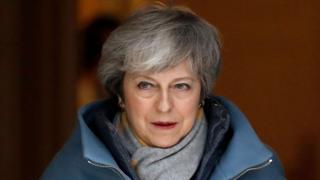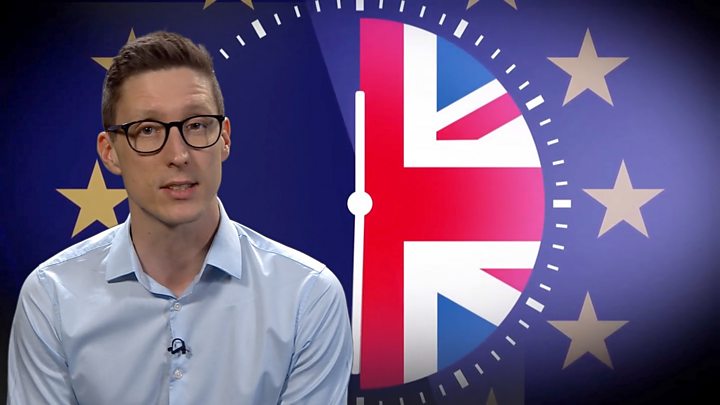Brexit: Theresa May will not ask EU for long extension
 Image copyright AFP/Getty
Image copyright AFP/Getty Theresa May will not be asking the EU for a long delay when she formally requests that Brexit is postponed.
Number 10 said the PM shared the public’s “frustration” at Parliament’s “failure to take a decision”.
EU Brexit negotiator Michel Barnier has said the EU will not grant a delay without a “concrete plan” from the UK about what they would do with it.
Under current law, the UK will leave the EU – with or without a deal – in nine days.
BBC assistant political editor Norman Smith said the delay would not be beyond the end of June.
Any delay will have to be agreed by all 27 EU member states and Mrs May is heading to Brussels on Thursday to discuss the matter with fellow leaders.

Media playback is unsupported on your device
Explaining that Mrs May “won’t be asking for a long extension” when she writes to the EU, Number 10 said: “There is a case for giving Parliament a bit more time to agree a way forward, but the people of this country have been waiting nearly three years now.
“They are fed up with Parliament’s failure to take a decision and the PM shares their frustration.”
It comes after MPs rejected the withdrawal deal Mrs May has negotiated with the EU for a second time last week by 149 votes. They also voted in favour of ruling out leaving the EU without a deal, and in favour of extending the Brexit process.
The prime minister had hoped to have a third attempt at getting MPs to back her deal – but Speaker John Bercow effectively torpedoed that with his surprise intervention.
He said a third “meaningful vote” could not happen in the coming days if it was “substantially the same” motion.
What happens next?
- The PM is writing to the EU to ask for Brexit to be postponed
- Mrs May will travel to an EU summit in Brussels on Thursday to discuss the delay options
- All 27 EU members have to agree to any extension proposed
- If an extension is agreed, Mrs May will probably try to get her deal – that was previously heavily defeated – through Parliament
- MPs and peers will also get a vote on any delay
- Talks have been continuing with the DUP and Tory Brexiteers who voted against the deal
- The government could seek to hold a third “meaningful vote” on the withdrawal agreement next week
- But the speaker has said he will not let MPs vote again if the question is exactly the same
- The UK leaves the EU on 29 March with or without a deal, unless a delay is agreed
While Mrs May still wants to put her deal before MPs one more time, she has said that even if that goes ahead and they vote in favour of it, the UK would need a short extension to get the necessary legislation through Parliament.
Mrs May had warned Brexiteer Tories that a longer extension would be needed if her deal did not get through Parliament.
Norman Smith said that if the EU agrees to a three-month delay, it opens up the possibility that the third meaningful vote could take place after next week.
But he added that the risk of taking a long delay off the table is that “Brexiteers can now just sit on their hands until 30 June”.
What is the EU saying?
At a news conference in Brussels, Mr Barnier said it was up to the 27 EU leaders to decide whether to grant a delay, based on what was in the “best interest” of the bloc.
Mr Barnier also warned that UK MPs voting against “no deal” would not prevent it from happening, adding that “everyone should now finalise all preparations for a no-deal scenario”.
BBC Europe editor Katya Adler said the EU’s final decision on a delay might not be given this week, with talk of an emergency summit on 28 March.
Earlier, German Chancellor Angela Merkel said she would struggle until the last possible moment to achieve “an orderly Brexit”, saying the interests of Germany, Britain and the EU were at stake.
What about the opposition parties?
Labour leader Jeremy Corbyn said the Speaker’s intervention showed Mr Bercow was “ensuring Parliament is taken seriously”.
He said he had spoken to Conservative and Labour MPs about a so-called Norway-Plus style of future relationship with the EU – a closer one than Mrs May’s deal would bring about – calling it an “interesting idea” which had not got his “complete support”.
Mr Corbyn also held “constructive” talks with the Westminster leaders of the SNP, Liberal Democrats, Plaid Cymru and Green Party about the potential to unite around a closer future relationship with the EU, a Labour spokesperson said.




